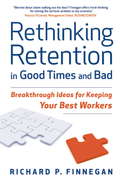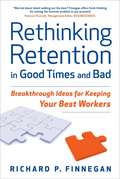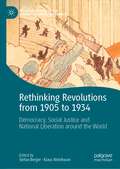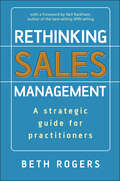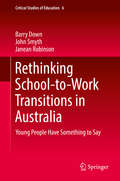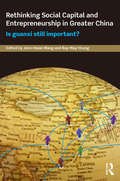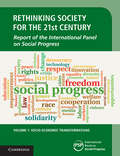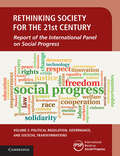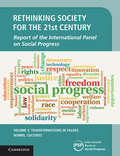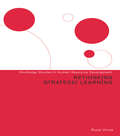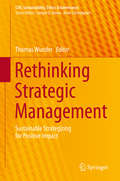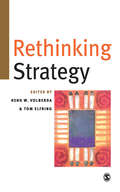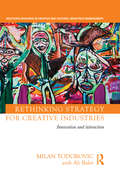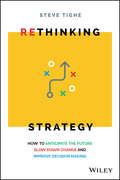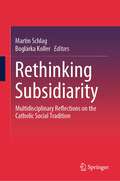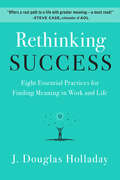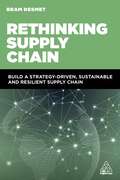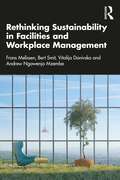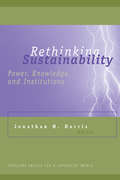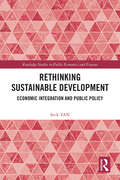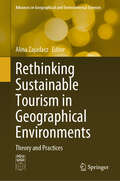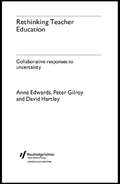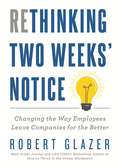- Table View
- List View
Rethinking Retention in Good Times and Bad: Breakthrough Ideas for Keeping Your Best Workers
by Richard FinneganHow do organizations keep the workers they want? Until now, employee retention strategies have been based on instincts rather than research. With no firm body of knowledge to use as a guide, employee turnover has been a problem for all organizations. Rethinking Retention in Good Times and Bad is the first book to offer a top-to-bottom, organization-wide retention action plan. Many organizations lose employees and profits because they don’t know which processes to put into place to cut employee turnover. They speak of building retention cultures but don’t know who should do what and when. This hands-on tactical guide gives those answers, providing specific strategies and tactics backed by the author’s own research and on-site experience. Rethinking Retention in Good Times and Bad is essential reading for all types of organizations—large or small, public or private, with high concentrations of low-skilled or high-skilled workers and across multiple industries. If you are losing workers you want to keep—in good economic times and bad—this book will tell you how to put retention solutions in place across your company.
Rethinking Retention in Good Times and Bad: Breakthrough Ideas for Keeping Your Best Workers
by Richard P. FinneganHow do organizations keep the workers they want? Until now, employee retention strategies have been based on instincts rather than research. With no firm body of knowledge to use as a guide, employee turnover has been a problem for all organizations. This book is the first to offer a top-to-bottom, organization-wide retention action plan. Many organizations lose employees and profits because they don't know which processes to put into place to cut employee turnover. They speak of building retention cultures but don't know who should do what and when. This hands-on tactical guide gives those answers, providing specific strategies and tactics backed by the author's own research and on-site experience. It is essential reading for all types of organizations-large or small, public or private, with high concentrations of low-skilled or high skilled workers, and across multiple industries. Also addressed is how to retain your high-performing workers in slow economic times. If you are losing workers you want to keep, this book will tell you how to put retention solutions in place across Read this book with a pen in your hand. Circle ideas you like, strike through those you don't, and make notes as to how you can apply these tactics in your company. Then pass it on to a colleague and ask her to do the same. Stir up your company's thinking on employee retention so progress happens, fast. --From the Introduction, Rethinking Retention in Good Times and Bad.
Rethinking Return on Investment: The Challenge of Accountable Meaningful Use (HIMSS Book Series)
by Pam ArlottoRethinking Return on Investment: The Challenge of Accountable Meaningful Use offers a timely exploration of the value achieved through the Meaningful Use of electronic health records and other components of the HITECH legislation. The authors provide a look back at how ROI of health IT has typically been measured and explore how Meaningful Use regulations are driving healthcare organizations to adopt a value-based purchasing model--thus challenging readers to rethink how they define the ROI of health IT. The authors examine Meaningful Use within a three-stage Value Management Framework: value identification, value realization and value optimization. To assist organizations in evaluating how to drive value out of an investment in people, processes and technology, the book includes numerous value maps for measuring a project's benefits, such as quality improvement, care management and cost reduction. The authors conclude by setting the stage for how the current impact of Accountable Meaningful Use will continue to transform the healthcare delivery system for years to come.
Rethinking Revolutions from 1905 to 1934: Democracy, Social Justice and National Liberation around the World (Palgrave Studies in the History of Social Movements)
by Stefan Berger Klaus WeinhauerThis edited collection offers a timely and original perspective on the many upheavals and revolutions that broke out across the world during the earlytwentieth century. With previous research tending to confine revolutions within national borders, this book sets out to place them within a broader global sphere of thought and action. The authors explore the time phase between the Russian Revolution of 1905 and the Asturian Revolution of 1934, including cases from South Africa, Australia, China, the Middle East and Latin America. Providing insights from leading scholars in the field, this collection highlights the interconnectedness and transnationalism of upheavals and revolutions, offering a new approach which integrates political, social and cultural history.Chapter 8 is available open access under a Creative Commons Attribution 4.0 International License via Link.springer.com
Rethinking Sales Management
by Beth RogersUntil recently, sales managers received no specific training for their jobs. However, selling has become more complex with the emergence of regulations and more sophisticated customers. Sales managers need to inspire and achieve sales results by managing teams of professionals and other resources. To do so, they need guidance on dealing with issues that arise in these broader aspects of their role.This concise guide for sales managers is based on a well-known sales management technique called the 'customer portfolio matrix'. Beth Rogers weaves her version of this throughout, enabling sales managers to see their strategy from the customer's point of view. Doing so will allow them to set realistic objectives, design new strategies that add real customer value, avoid wasting time on price-oriented customers and deploy resources for maximum results.
Rethinking School-to-Work Transitions in Australia: Young People Have Something To Say (Critical Studies of Education #6)
by John Smyth Barry Down Janean RobinsonThis book draws on the stories of thirty-two young Australians to identify the barriers and obstacles they face in 'getting a job' in precarious times and from their vantage point. It maps the kinds of educational policies and practices that need to be created and more widely sustained to assist their career aspirations and life chances. It is timely in terms of contributing to an alternative set of possibilities based on a commitment to the principles and values of social justice, respect, trust, care, democracy and citizenship. In constructing an alternative vision and practice for education and training it advocates the right of all young people to have a say in these broader public debates. In pursuing this agenda, it deliberately sets out to listen to what young people themselves have to say with a view to interrupting the way things are. In other words, the book seeks to identify and explain the dreams, desires and aspirations of young people with a view to creating a new imaginary and socially just future.
Rethinking Social Capital and Entrepreneurship in Greater China: Is Guanxi Still Important? (Routledge Culture, Society, Business in East Asia Series)
by Ray-May Hsung Jenn-Hwan WangFamily networks and wider personal social relationships - guanxi - have long been held to be a significant factor making for the success of many Chinese family businesses, and guanxi is often seen as a special characteristic which shapes the nature of all business in China. This book re-examines this proposition critically, bringing together the very latest research and comparing the situation in different parts of "Greater China" – mainland China, Taiwan and Hong Kong. It considers entrepreneurship, venture capital, intergenerational succession, disputes, family businesses in different sectors of the economy, and particular family businesses. Among the book’s many interesting conclusions is the observation that guanxi capitalism has evolved in different ways in the different parts of Greater China, with the particular institutional setting having a major impact.
Rethinking Society for the 21st Century: Report of the International Panel on Social Progress
by International Panel on Social ProgressThis is the first of three volumes containing a report from the International Panel on Social Progress (IPSP). The IPSP is an independent association of top research scholars with the goal of assessing methods for improving the main institutions of modern societies. Written in accessible language by scholars across the social sciences and humanities, these volumes assess the achievements of world societies in past centuries, the current trends, the dangers that we are now facing, and the possible futures in the twenty-first century. It covers the main socio-economic, political, and cultural dimensions of social progress, global as well as regional issues, and the diversity of challenges and their interplay around the world. This particular volume covers topics such as economic inequality and growth, finance and corporations, labor, capitalism, and social justice.
Rethinking Society for the 21st Century: Report of the International Panel on Social Progress
by International Panel on Social ProgressThis is the second of three volumes containing a report from the International Panel on Social Progress (IPSP). The IPSP is an independent association of top research scholars with the goal of assessing methods for improving the main institutions of modern societies. Written in accessible language by scholars across the social sciences and humanities, these volumes assess the achievements of world societies in past centuries, the current trends, the dangers that we are now facing, and the possible futures in the twenty-first century. It covers the main socio-economic, political, and cultural dimensions of social progress, global as well as regional issues, and the diversity of challenges and their interplay around the world. This particular volume covers topics such as democracy and the rule of law, violence and wars, international organizations and global governance, and media and communications.
Rethinking Society for the 21st Century: Report of the International Panel on Social Progress
by International Panel on Social ProgressThis is the third of three volumes containing a report from the International Panel on Social Progress (IPSP). The IPSP is an independent association of top research scholars with the goal of assessing methods for improving the main institutions of modern societies. Written in accessible language by scholars across the social sciences and humanities, these volumes assess the achievements of world societies in past centuries, the current trends, the dangers that we are now facing, and the possible futures in the twenty-first century. It covers the main socio-economic, political, and cultural dimensions of social progress, global as well as regional issues, and the diversity of challenges and their interplay around the world. This particular volume covers topics such as world cultures and religions, families, global health, education, and the contributions of social sciences to institutional change.
Rethinking Sovereign Debt: Politics, Reputation, and Legitimacy in Modern Finance
by Odette LienauConventional wisdom holds that all nations must repay debt. Regardless of the legitimacy of the regime that signs the contract, a country that fails to honor its loan obligations damages its reputation, inviting still greater problems down the road. Yet difficult dilemmas arise from this assumption. Should today's South Africa be responsible for apartheid-era debt? Is it reasonable to tether postwar Iraq with Saddam Hussein's excesses? Rethinking Sovereign Debt is a probing historical analysis of how sovereign debt continuity--the rule that nations should repay loans even after a major regime change, or expect reputational consequences--became the consensus approach. Odette Lienau contends that the practice is not essential for functioning international capital markets, and demonstrates how it relies on ideas of absolutist government that have come under fire over the last century. Challenging previous accounts, Lienau incorporates a wealth of original research to argue that Soviet Russia's repudiation of Tsarist debt and Great Britain's 1923 arbitration with Costa Rica hint at the feasibility of selective debt cancellation. She traces the notion of debt continuity from the post-World War I era to the present, emphasizing the role of government officials, the World Bank, and private-market actors in shaping our existing framework. Lienau calls on scholars and policymakers to recognize political choice and historical precedent in sovereign debt and reputation, in order to move beyond an impasse when a government is overthrown.
Rethinking Strategic Learning (Routledge Studies In Human Resource Development Ser. #Vol. 11)
by Russ VinceRuss Vince examines learning as both a social and a strategic process, invariably linked to emotions and politics that are mobilized by attempts at learning and organizing. He makes a substantial contribution to theories of organizational learning and develops new ideas about critical reflection and collective leadership.The author outlines a criti
Rethinking Strategic Management: Sustainable Strategizing for Positive Impact (CSR, Sustainability, Ethics & Governance)
by Thomas WunderThis book offers innovative ideas and frameworks for sustainable strategizing to advance business by scaling-up its positive impact, which is so urgently needed at this time in the 21st century. It shows practitioners how to effectively deal with socio-ecological systems’ disruptions to their operating environments and play an active role in transforming markets toward a sustainable future. In short, the book demonstrates how to make business sense of sustainability, highlighting new approaches and examples that translate sustainability into strategy and action. The ultimate goal is to provide a path toward a thriving future for both business and society. This book was written for strategy practitioners and decision makers who want to understand why sustainable strategizing is important in today’s business world and are seeking actionable business knowledge they can apply in their companies. It was also written for students of management and can be used as a supplemental text to support traditional graduate and undergraduate management courses.
Rethinking Strategy (Strategic Management And Planning Ser.)
by Tom Elfring Henk W. Volberda`Readers interest in an overview of important aspects of the strategy field will find this book a helpful volume to add to their shelves′ - Administrative Sciences Quarterly This is a new overview of the strategy field, with internationally renowned contributors summarizing the latest directions and developments in strategic management theory in the context of their theoretical roots in economics, organization theory, and systems theory. The contributors outline the most promising new directions on the basis of a systemic treatment of paradigms or schools of thought in strategy: redrawing firm boundaries, developing dynamic capabilities and discovering viable strategy configurations. The volume will be an invaluable companion to advanced courses in strategy and management, used as a reader alongside case material and field studies. As well as providing a summary and evaluation of the different schools of thought in strategy, the volume offers a synthesis of the American and European approaches.
Rethinking Strategy for Creative Industries: Innovation and Interaction (Routledge Research in Creative and Cultural Industries Management)
by Milan Todorovic with Ali BakirCreative Industry practices are increasingly manifested through hybrid models and methods and emerging sub-sectors. With ever finer dividing lines between form and content, product and service, participation and consumption, the distinctions between sectors are increasingly blurred, while new, convergent models emerge. Reflecting this fluid context, this book provides a new perspective on strategy in the Creative Industries. Based on extensive original research and live empirical data derived from case studies, interviews, and observations with creative managers, it reveals strategic decision-making by analysing business manoeuvres and stages of innovation in the Creative Industries. Through analysing the interactive features of aesthetically driven information assets, and how new user/consumer cultures are applied, it uncovers the principles that are transforming strategy in the Creative Industries. This innovative volume will be of significant interest to scholars, advanced students and practitioners in the Creative Industries as well as well as industry consultancies and practitioners.
Rethinking Strategy: How to anticipate the future, slow down change, and improve decision making
by Steve TigheSeize opportunity from uncertainty What if you could use strategy to turn market volatility to your competitive advantage? Rethinking Strategy shows you how to anticipate and benefit from emerging market shifts and free your organisation from a cycle of disruption and response. In this ground-breaking book, author and strategist Steve Tighe helps you use scenarios to envisage what your industry and organisation could look like in the future and prepare for what’s to come. Through detailed case studies and practical tools, this guide reveals how to make strategy development your organisation’s principal creative and learning activity. anticipate impending market shifts before they emerge slow down change by making the future familiar unlock the entrepreneurial talent that lies within your organisation mobilise an army of internal advocates to drive strategy execution embed foresight into your planning and innovation processes Have you ever wondered how some companies seem to always be ahead of the curve while others struggle to keep up in today’s ever-changing competitive environment? With Rethinking Strategy, you’ll learn how to make better decisions and thrive alongside increasing competition and uncertainty.
Rethinking Subsidiarity: Multidisciplinary Reflections on the Catholic Social Tradition
by Martin Schlag Boglárka KollerThis book takes a fresh and interdisciplinary approach to the concept of subsidiarity. While subsidiarity is commonly understood as an organizational principle that assigns competences to the appropriate level within an organization, its application extends beyond politics. This innovative book offers a comprehensive analysis that includes religious and secular perspectives, exploring the relevance of subsidiarity to society, business, law and politics.By bridging the gap between theology, philosophy, political science, law, and history, this volume fills a significant gap in the literature. It reexamines the ideological foundations of subsidiarity within the Catholic social tradition, investigates its practical implications, and questions how it can address the challenges faced by contemporary business environments, particularly issues of social inequity. With a normative and conceptual approach, the book critically reflects on the links between subsidiarity and themes such as responsible business practices, ecological concerns, individual autonomy, and the common good. By exploring the potential of subsidiarity to overcome dichotomies and promote a middle ground between government-based solutions and individual freedom, the volume offers valuable insights and practical solutions.This volume stands out as the first major study dedicated to subsidiarity in society, business, law and politics. Through its multidisciplinary lens, it sheds light on unexplored connections and highlights the role of subsidiarity in fostering ethical and socially responsible behavior. It is an essential resource for researchers, PhD and graduate students, as well as professionals in theology, philosophy, political sciences, law, and history who seek a comprehensive understanding of subsidiarity and its implications for contemporary issues.
Rethinking Success: Eight Essential Practices for Finding Meaning in Work and Life
by J. Douglas HolladayThe founder and CEO of Path North, Georgetown University professor, and former White House advisor teaches you how to find meaning, balance, and purpose throughout your career while reaching the highest levels of professional achievement—how to do well without losing yourself.Throughout his illustrious career, J. Douglas Holladay has taught generations of executives as well as students in his popular MBA course at Georgetown how to use a holistic approach to defining and reaching success in life and business. Success does not come with an instruction manual. Too often “successful” people end up feeling empty, isolated, and depressed because they have lost focus on what is most important in their lives. Rethinking Success can help anyone, no matter their field, maintain the practices and values that keep them in tune with their most cherished beliefs throughout their careers. Drawn from the insights of his network of famous friends as well as his experiences as an investment banker, White House advisor, diplomat, longtime business professor, and non-profit consultant, the advice in Rethinking Success is centered around eight essential questions we must ask ourselves regularly to stay focused, connected, and joyful throughout our working lives.Filled with essential wisdom, Rethinking Success is a powerful guide that allows us to do well while staying in tune with the values and beliefs that are most important to us.
Rethinking Supply Chain: Build a Strategy-Driven, Sustainable and Resilient Supply Chain
by Dr Bram DeSmetRethinking Supply Chain outlines how organizations can close the gap between the supply chain capabilities they have and the supply chain capabilities they want.The supply chains built pre-covid are no longer suitable in the current volatile business environment. Rethinking Supply Chain explores why and how organizations can upgrade their supply chains to level 5 maturity, enhancing them to be more sustainable, strategy-driven and resilient. It outlines the dangers of using outdated supply chain practices, sharing what goes wrong when organizations run level 5 complexity and variability with a level 1 capability. It shows how organizations can improve their strategic planning, supply chain design, sales and operations planning and business planning processes to respond to new dynamic levels of variability and complexity. It is supported by practical frameworks and roadmaps. This book outlines why supply chain reconfiguration is needed, how to define a business case for change and the steps needed to drive effective transformation. Rethinking Supply Chain also explores how to integrate sustainability into the heart of supply chain design and operations and examines the trade-offs organizations must navigate, depending on whether they wish to be at par, differentiate or dominate on sustainability drivers.
Rethinking Sustainability in Facilities and Workplace Management
by Bert Smit Frans Melissen Vitalija Danivska Andrew Ngawenja MzembeThis book discusses sustainability within the facility management industry. However, it is not another anthology of so-called best practices and the seemingly endless range of certification schemes. It is also not a (marketing) guide on how to communicate high-pitched sustainability ambitions to potential customers to increase (short-term) market share. Instead, this book is based on the realisation that most facility management businesses and departments actually find it hard to truly integrate sustainability into their strategies, tactics and day-to-day operations in a coherent way. It is also based on the reference point that sustainable development cannot be realised only through technological advancements and new procedures; it requires new behavioural patterns of people. Not only of your own employees, as a supplier or department, but also of those for whom you design, stage and manage optimal workplace experiences. Those patterns will not emerge from nowhere but need to be purposely created and cultivated, based on a thorough understanding of what people and organisations need, want and desire. Through reviewing specific barriers and opportunities related to practical situations and examples at all three levels of facility management – the operational, tactical and strategic level – and supported by the latest theoretical insights, this book provides students and practitioners with inspiration and suggestions for using sustainability as a guideline for improving workplace experience concepts and FM strategies, services and processes. Each chapter uses specific cases and examples as the starting point for reflecting on avenues to move from treating sustainability as an add-on to using it as a powerful concept to create optimal workplace experiences. In doing so, these reflections provide lecturers, students and current and future professionals with practical guidelines and pointers to take sustainability within the facility management industry to a much-needed next level.
Rethinking Sustainability: Power, Knowledge, and Institutions
by Jonathan M. HarrisBringing together the thoughts of economists, political scientists, anthropologists, philosophers, and agricultural policy professionals, this volume focuses on the issues of sustainability in development. Examining such topics as international trade, political power, gender roles, legal institutions, and agricultural research, the contributors focus on the missing links in theory and practice that have been barriers to the achievement of truly sustainable development. Any theory of sustainable development must take into account economic, social, and environmental dimensions. Until recently, the question "What is development?" was often answered predominantly from the economist's perspective, with high priority being assigned to expansion of economic output. Social, political, institutional, and ethical aspects have often been neglected. But now that sustainable development has become a broadly accepted concept, it is impossible to maintain a narrowly economistic view of development. For this reason, the varied perspectives offered by the contributors to this volume are crucial to understanding the process of development as it relates to environmental sustainability and human well-being. The selection of articles is meant to be stimulating and provocative rather than comp-rehensive. They are roughly divided between those dealing with broad theoretical issues concerning the economic, political, and social aspects of development (Part I) and those presenting more applied analysis (Part II). The common thread is a concern for examining which factors contribute to making development socially just and environmentally sound. Rethinking Sustainability will be of interest to economists and social scientists, development professionals, and instructors seeking to offer their students a broad perspective on development issues.
Rethinking Sustainable Development: Economic Integration and Public Policy (Routledge Studies in Public Economics and Finance)
by Seck TANThis book demonstrates falsified economic performance of global economies when the environment is not recognised as a capital, and when the ecosystem is overlooked towards sustainable development.Seck begins with an analysis of standard macroeconomic framework and policy practice. He argues, with reference to environmental accounting literature, that environmental capital must form an integral component of economic measurement. This paves the way for an alternative environmental-macroeconomics framework for policy analysis that promotes sustainable development. The book demonstrates how environmental capital can be measured with reference to select OECD countries and provides a methodology for analysing how macroeconomic goals are related to a steady-state economy. Seck then concludes with a summary of the conflict between current economic growth and ecosystem preservation, and outlines possible policy improvements and directions for research.Rethinking Sustainable Development is an invaluable reference for policymakers as well as researchers and students of environmental economics, sustainable development, and macroeconomics.
Rethinking Sustainable Tourism in Geographical Environments: Theory and Practices (Advances in Geographical and Environmental Sciences)
by Alina ZajadaczThis book covers the current escalation of social problems related to the unstable political situation, economic crisis, as well as growing problems related to the state of the natural environment (existential climate crisis; pollution of land, oceans, and the atmosphere; severe declines in biodiversity) which requires a new rethinking of the sustainable tourism paradigm, in relation to the realities of the modern world, based on the practices observed in the tourist services sector. „Tourism is like fire, you can cook food on it, you can also burn down your house”—says the proverb. On the one hand, it allows for the regeneration of physical and mental strength of visitors, as well as provides funds for the economic development of the destination, but on the other hand, it contributes to a lot of damage to the geographical environment. The period of "stopping" of tourism during the lockdown caused by the COVID-19 pandemic allowed many areas to be relieved of the tourist traffic, which resulted in the observed revitalization of the natural environment, but also huge social and economic problems in destinations that are largely dependent on income from tourism. The rapid resurgence of tourism after the pandemic restored revenues but also caused many social tensions. The problem of overtourism returned, and residents protested, calling for "tourists to go home." The entire tourism system requires a thorough analysis of the complex consequences of its development. This book presents many challenges facing contemporary tourism. Its theoretical and practical aspects provide a useful knowledge base for both researchers studying changes in tourism and practitioners in the tourism services sector. The content also serves as an inspiration to search for optimal solutions aimed at the sustainable development of contemporary and future tourism.
Rethinking Teacher Education: Collaborative Responses to Uncertainty
by Anne Edwards Peter Gilroy David HartleyRethinking Teacher Education is a thorough and critical analysis of the ambivalences and uncertainties that face those in teacher education. The authors draw on their different experiences of teacher education to try to make sense of current practices and where they might lead.The book analyzes past and present constructions of teacher education and offers insights into how a re-evaluation might address teachers' positions in relation to knowledge, learners, economic demands and democratic values. The issues addressed include:* political and economic uncertainty and teacher education* philosophical uncertainty and teacher education* modernist policy solutions* psychology: an agent of modernity in teacher education* sociocultural and other collaborative responses to uncertainty.The book will be of interest to all those involved in teacher education, including sociologists, psychologists and philosophers of education.
Rethinking Two Weeks' Notice: Changing the Way Employees Leave Companies for the Better
by Robert GlazerIt's a shame to let a bad ending spoil a good relationship - but that's what happens in most companies every day. Employees who are thinking of leaving keep their plans secret until they are confident of their next steps and suddenly put in their two weeks' notice. Companies might retaliate by asking them to leave immediately and not even letting them stay the full two weeks. And on the other hand, companies fire or layoff employees with hardly any warning all the time as well - and those employees don't even get the courtesy of a two weeks' notice. In either scenario, both parties feel blindsided and are left scrambling.But there is a better way - by creating an open transition program (OTP), companies and employees can be honest when they don't feel a role is working and make a plan together to find a better fit. OTPs are built on four foundational principles:Psychological safety throughout the organization, so that employees feel safe to say when something isn't workingHonest communication through feedbackRespectA commitment to mutually beneficial outcomes for both partiesWith these four principles in place, organizations can create a culture where everyone feels empowered to pursue the best fit role for them. When an ending is the right decision, it happens with transparency, trust, and a solid transition. This book guides managers in creating open transition programs throughout their organizations so that everyone can find the right role.
